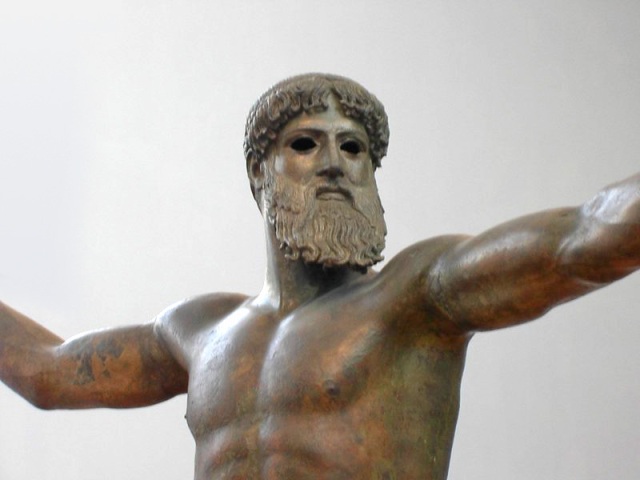
“The Artemision Bronze, a bronze statue of deity, either Poseidon or Zeus, about to hurl a missing projectile (either a thunderbolt, if Zeus, or a trident if Poseidon). Height: 2.1 m. ca. 460 BC. Found in shipwreck off Cape Artemisium. Athens National Archaeological Museum.” https://en.wikipedia.org/wiki/Sounion#/media/File:Poseidon.jpg

We travel to that last of the gas giants, Neptune, and learn about Poseidon. This Greek god of the sea, earthquakes, and horses is brother to Zeus (Jupiter) and has a mind of his own when it comes to the Trojan War.
https://www.podbean.com/media/player/36wgj-620d8c?from=yiiadmin
Download this episode (right click and save)
Source Passages
Homer Iliad 15.38-48, 176-220
Translation Sources
Homer. Iliad. Trans. Stanley Lombardo. Indianapolis: Hackett, 1997.
Selected Sources
NASA. “Neptune.” http://solarsystem.nasa.gov/planets/neptune
Shout Outs & Notes
Check out The Endless Knot (http://www.alliterative.net) podcast by Mark Sundaram and Aven McMaster.
Join us on Twitter @InnesAlison and @darrinsunstrum
Subscribe on iTunes so you don’t miss an episode! https://itunes.apple.com/ca/podcast/mythtake/id1103569489?mt=2
Find our RSS on Podbean http://alisoninnes.podbean.com
This week’s theme music: “Super Hero” by King Louie’s Missing Monuments from the album “Live at WFMU” (2011). Used under Creative Commons license. Music used under Creative Commons license and available from Free Music Archive.

Pingback: Aigai Poseidon mosaic | Bijbelvorser = Bible Researcher
I absolutely LOVE your podcast. I’ve been interested in Greek mythology since writing my AP English essay on Medea. I really enjoy the “fresh takes” you both bring to the tales. This may be in the works, but I’d love to hear more about Dionysus and perhaps tying in the role of wine for the ancients. Linguistically for example, Homer’s labeling the sea as “wine-dark” as evidence the ancients perceived the color blue differently than we do now. Maybe this could turn into a small series on the gastronomy of ancient Greece and associated deities? Thanks for a great listen as always, and looking forward to more!
LikeLike